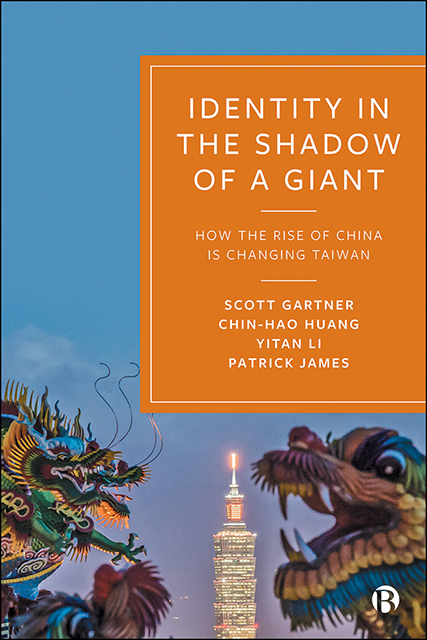Book contents
- Frontmatter
- Dedication
- Contents
- List of Figures and Tables
- About the Authors
- Acknowledgements
- Preface
- 1 Identity in the Shadow of a Giant: How the Rise of China Is Changing Taiwan
- 2 Taiwan in Historical Perspective
- 3 The Problématique of Taiwanese Identity
- 4 Theorizing about Identity, Change in Capabilities and Dyadic Relations: An Approach Based on Analytic Eclecticism and Systemism
- 5 Elite Reflections
- 6 Popular Reflections (Survey I)
- 7 Factors Influencing Identifying Only as Taiwanese: A Layered Empirical Approach (Survey II)
- 8 A New Vision of Taiwanese Identity, the Rise of China, Cross-Strait Relations and the United States in Northeast Asia
- Appendix A Research Interview Questions, September–October 2015
- Appendix B Taiwanese Identity and the Rise of China: Survey Questions, 27 October 2015
- Appendix C Taiwan National Security Survey by Emerson Niou
- References
- Index
7 - Factors Influencing Identifying Only as Taiwanese: A Layered Empirical Approach (Survey II)
Published online by Cambridge University Press: 15 April 2023
- Frontmatter
- Dedication
- Contents
- List of Figures and Tables
- About the Authors
- Acknowledgements
- Preface
- 1 Identity in the Shadow of a Giant: How the Rise of China Is Changing Taiwan
- 2 Taiwan in Historical Perspective
- 3 The Problématique of Taiwanese Identity
- 4 Theorizing about Identity, Change in Capabilities and Dyadic Relations: An Approach Based on Analytic Eclecticism and Systemism
- 5 Elite Reflections
- 6 Popular Reflections (Survey I)
- 7 Factors Influencing Identifying Only as Taiwanese: A Layered Empirical Approach (Survey II)
- 8 A New Vision of Taiwanese Identity, the Rise of China, Cross-Strait Relations and the United States in Northeast Asia
- Appendix A Research Interview Questions, September–October 2015
- Appendix B Taiwanese Identity and the Rise of China: Survey Questions, 27 October 2015
- Appendix C Taiwan National Security Survey by Emerson Niou
- References
- Index
Summary
Overview
People in Taiwan increasingly view their identity as separate and different from those on the Mainland. The Taiwanese sense of self in the new millennium is complex, dynamic and relational (Liu, 2016). Cross-Strait relations play a crucial role in influencing how the people of Taiwan view themselves and their relationship with the PRC (Kastner, 2016). In Taiwan, many citizens now feel they have the choice of identifying as Taiwanese, Chinese or both, rejecting the notion that their past dictates their present (van der Horst, 2016; Green, 2017). Furthermore, we saw in Chapters 5 and 6 that a wide variety of factors influence elite and mass identity formation in Taiwan. In particular, the qualitative and quantitative empirical analyses discussed in this study thus far demonstrate that there has been a significant shift in identity formation; Taiwan's democratization process now plays a major role in affecting the preferences of those who see themselves as Taiwanese (Friedberg, 2005).
What is it to be Taiwanese? This is the question that Jacobs and Kang ask in Changing Taiwanese Identities (2018). We start this chapter with an even stronger question, what is it to be only Taiwanese? Our focus here is on the factors that influence someone to identify as exclusively Taiwanese. We are especially interested in building on the survey results of Chapter 6 by examining individual characteristics and contextual conditions that influence identity in Taiwan in addition to the critical factors democracy and the US. In this chapter, we are interested in how beliefs about cross-Strait relations influence an individual's ideational formation as exclusively Taiwanese (Callahan, 2010; Kastner, 2016; Liu, 2016; Li and Zhang, 2017). This focus reflects a priority given the rapid rise of China across a variety of domains, but most especially in the economic domain (Chen, 2014; Mearsheimer, 2014a). Doing so can help us gain greater analytical clarity and insights into how and why a ‘Taiwanese only’ identity has evolved on the island.
This chapter unfolds in six additional sections. The second section reviews our theoretical approach. The third section describes the Taiwan National Security Survey Data and the variables developed to address these questions. The fourth section conducts multivariate statistical analyses with a focus on Proportional Reduction of Error (PRE) to explore critical questions about factors influencing Taiwanese identity. In doing so, we focus on Taiwanese–Mainland relational issues, such as the 1992 Consensus.
- Type
- Chapter
- Information
- Identity in the Shadow of a GiantHow the Rise of China is Changing Taiwan, pp. 155 - 180Publisher: Bristol University PressPrint publication year: 2021



